Primary Metrics
MSU is committed to providing more students with access to excellence. By 2030, we will increase our six year graduation rate to 86% and become an even more accessible institution by creating new pathways to educational opportunities.
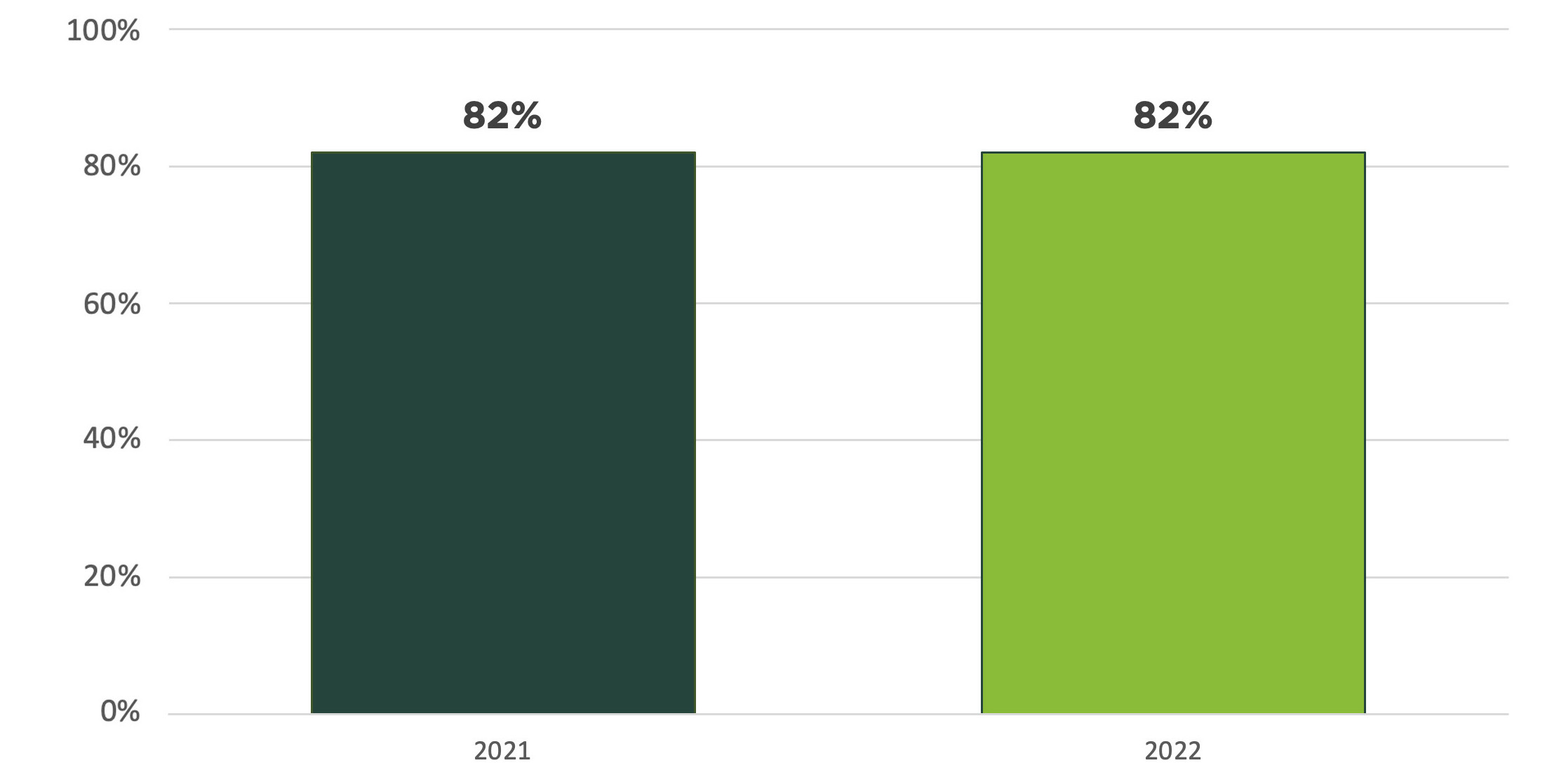
By 2030, the university aims to increase the number of graduate programs and concentrations consistently appearing in the top 10 and 25 of U.S. News & World Report’s graduate-level disciplinary rankings to 25 in the top 10 and 35 in the top 25.
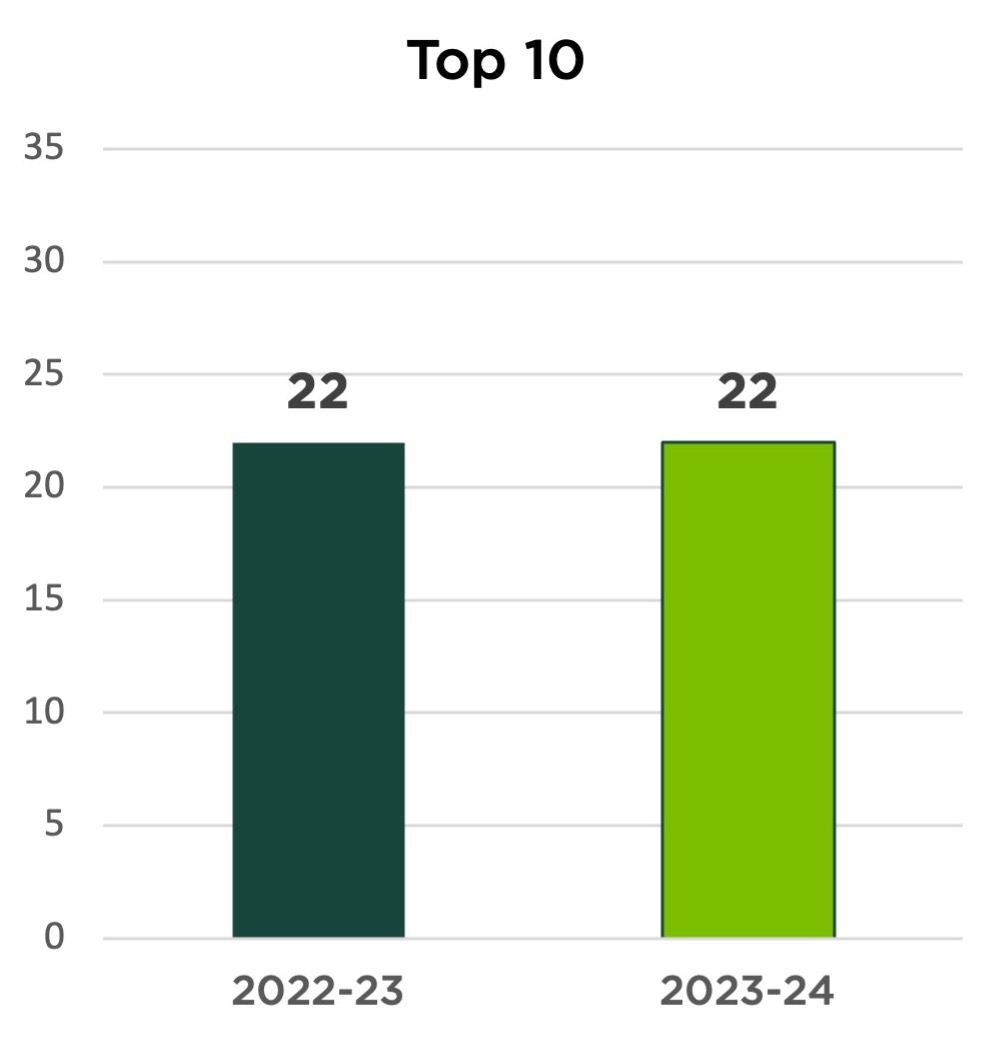
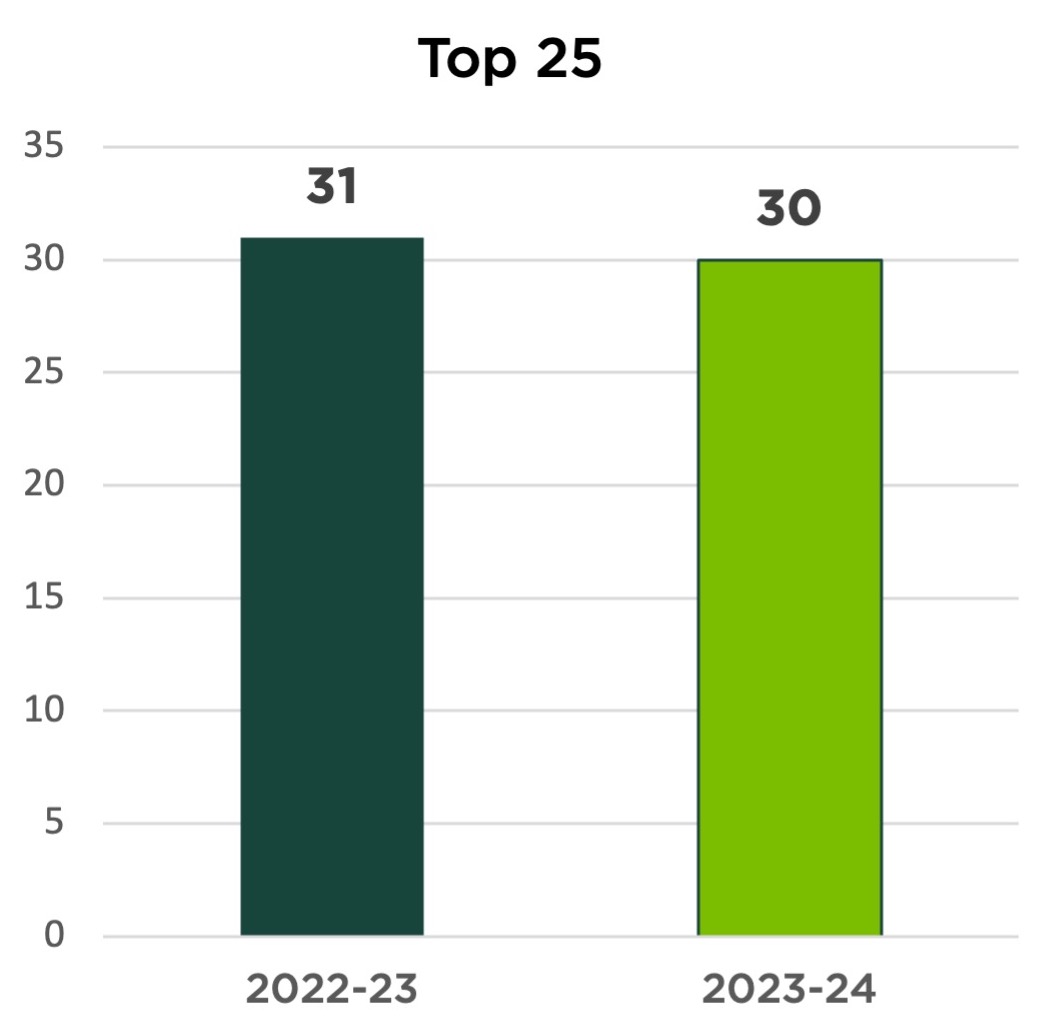
Six months after graduation, 93% of spring and summer bachelor’s degree graduates are working or continuing their education (2018-2022).*
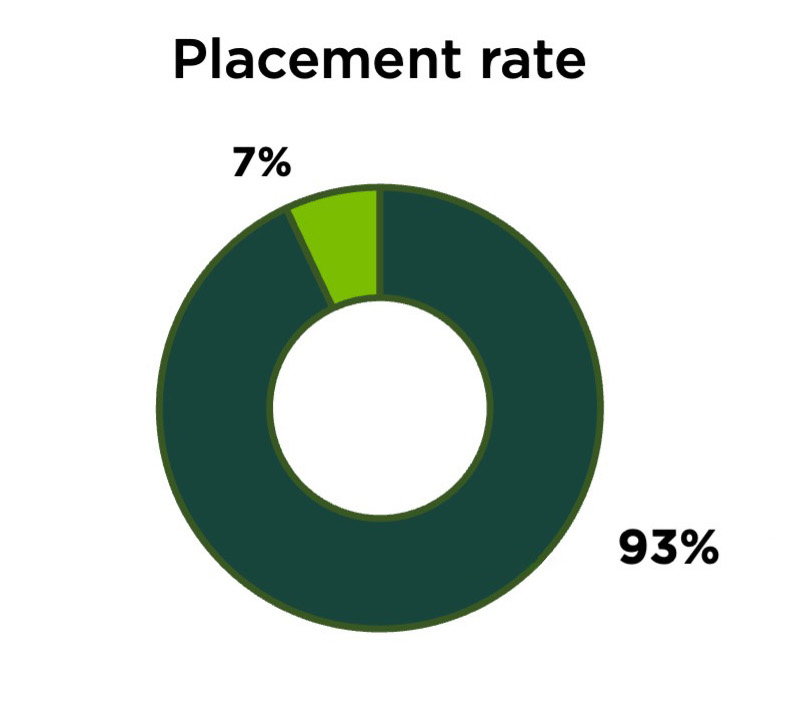
*Of graduates who responded to the survey as well as other data sources including the National Student Clearinghouse, internal MSU systems and public sources like LinkedIn.
The Student Experience Survey is conducted annually in October among graduate and undergraduate students. Student sense of belonging is measured using three factors (see chart below). Currently, the Student Success Executive Advisory Group is focusing on initiatives to enhance university support and acceptance.
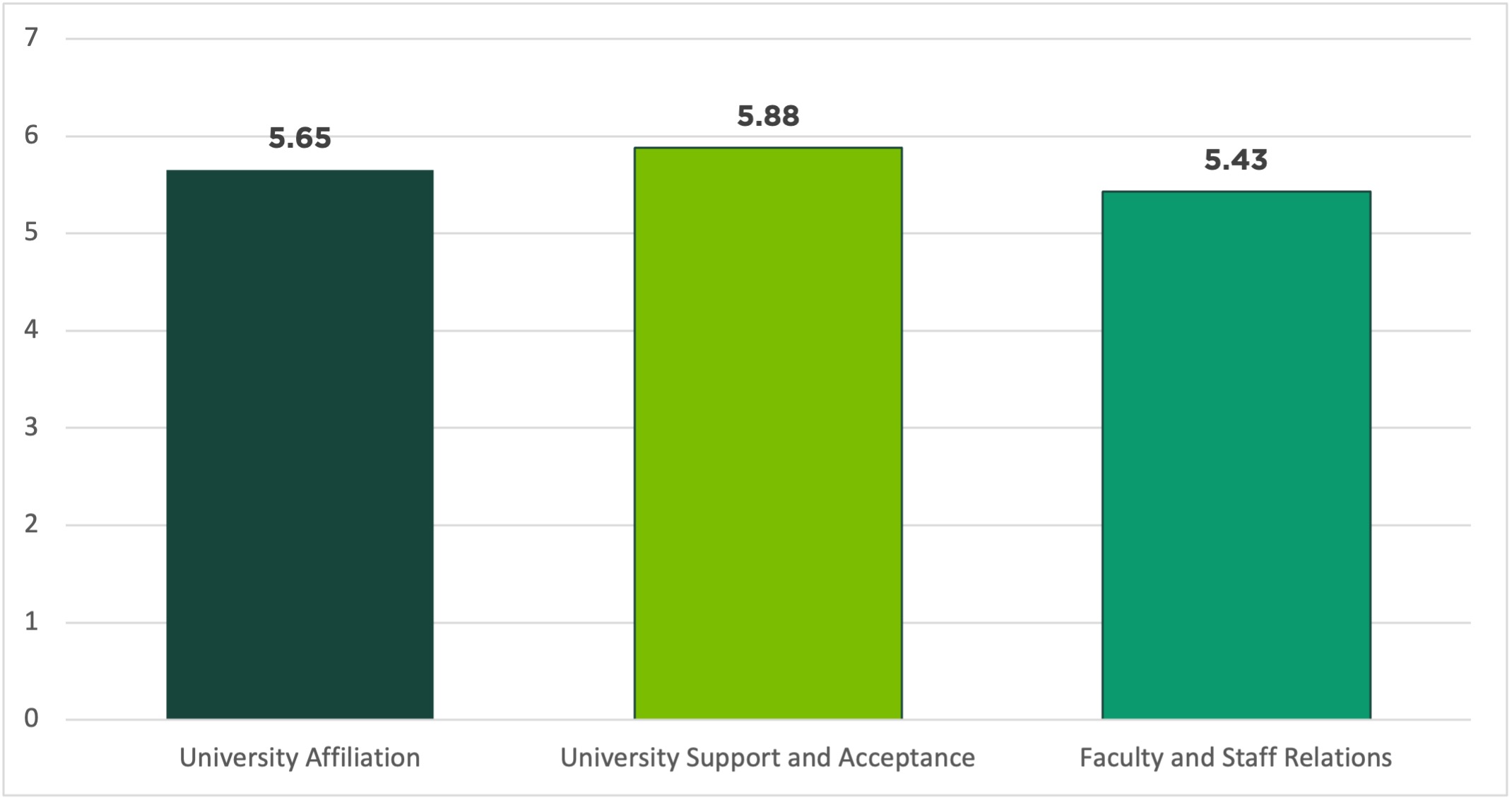
Mean respondent answer on a seven-point Likert scale.
Key Initiatives
Graduate student experience
 MSU is improving the graduate student experience in a variety of ways. The University Fellowship program focuses on recruiting and retaining a more diverse body of students while increasing the number of participants to 50 per year — a 25% increase — by 2028. Additionally, the newly titled Office of Graduate Life and Wellness strives to ensure graduate and professional students are provided meaningful opportunities to improve their overall well-being by helping them to thrive while achieving their academic and professional goals. The initiative’s progress and the overall well-being of graduate students and graduate professionals will be measured through workshop and activity participation metrics, resource accessibility and surveys.
MSU is improving the graduate student experience in a variety of ways. The University Fellowship program focuses on recruiting and retaining a more diverse body of students while increasing the number of participants to 50 per year — a 25% increase — by 2028. Additionally, the newly titled Office of Graduate Life and Wellness strives to ensure graduate and professional students are provided meaningful opportunities to improve their overall well-being by helping them to thrive while achieving their academic and professional goals. The initiative’s progress and the overall well-being of graduate students and graduate professionals will be measured through workshop and activity participation metrics, resource accessibility and surveys.
Strengthening advising
 MSU is investing in student advising through the Advising Initiative, which is building a new shared model of advising for all first- and second-year students. The model, being developed with all 14 undergraduate colleges and the Office of the Associate Provost for Undergraduate Education, creates strategic student transition plans that support major exploration and identity development as well as overall student success. To advance the effort, work groups were established to assess the advising process and make recommendations on student pathways as well as lead personnel and organizational change and communications efforts. In addition to the 15 advising staff members hired in the past year, the university plans to hire 15 to 20 more by fall semester 2023.
MSU is investing in student advising through the Advising Initiative, which is building a new shared model of advising for all first- and second-year students. The model, being developed with all 14 undergraduate colleges and the Office of the Associate Provost for Undergraduate Education, creates strategic student transition plans that support major exploration and identity development as well as overall student success. To advance the effort, work groups were established to assess the advising process and make recommendations on student pathways as well as lead personnel and organizational change and communications efforts. In addition to the 15 advising staff members hired in the past year, the university plans to hire 15 to 20 more by fall semester 2023.
Some college, no degree student access and success
 MSU is working to become the premier Michigan university for individuals who have attended some college but have not completed a degree. These students have unique needs and often encounter barriers to enrolling and completing their education. MSU’s efforts to support these students include transforming curriculum, adding completion advisers and providing financial support as well as building business partnerships to enhance access for students in the workforce. Students looking to complete degrees will benefit from MSU’s increasing number of courses offered online or scheduled during the evening and on weekends. MSU is also in the process of expanding its educational offerings to include three to five new certificate programs by 2024 and will present a proposed policy regarding credit for prior learning to Academic Governance in the fall of 2023.
MSU is working to become the premier Michigan university for individuals who have attended some college but have not completed a degree. These students have unique needs and often encounter barriers to enrolling and completing their education. MSU’s efforts to support these students include transforming curriculum, adding completion advisers and providing financial support as well as building business partnerships to enhance access for students in the workforce. Students looking to complete degrees will benefit from MSU’s increasing number of courses offered online or scheduled during the evening and on weekends. MSU is also in the process of expanding its educational offerings to include three to five new certificate programs by 2024 and will present a proposed policy regarding credit for prior learning to Academic Governance in the fall of 2023.
Student sense of belonging, supporting persistence
 MSU is increasing access to education with four new efforts that cultivate a sense of belonging and support persistence through graduation.
MSU is increasing access to education with four new efforts that cultivate a sense of belonging and support persistence through graduation.
- The Black Student Success Initiative works to eliminate disparities in educational outcomes for Black students through a deeper understanding of their experiences, needs and hopes. The effort includes a student advisory committee, undergraduate research opportunities and mentoring.
- The Transfer Student Success Project works to transform the way transfer students are supported at MSU by aligning operational needs and creating more equity in policies. The Envision Green program — in which Lansing Community College students can finish their degree at MSU — will expand into a cohort-based program with the first group of students beginning in the fall of 2024.
- The Retention Data Mapping Project focuses on identifying all the places student retention data is housed, who has access and how the data can be better aligned and connected to enhance efficiency and lead data-informed improvement efforts.
- The Executive Committee on Student Retention and Operations Retention Group are working to mitigate disparities evident in persistence and graduation rates and increase degree completion rates for all students. The goal of the work is to close opportunity gaps in persistence and graduation.
Student resource coordination
 MSU is establishing a one-stop shop for student services to streamline access to the services students need to support their success. This model provides a seamless experience that reduces mental strain and supports persistence and degree completion. MSU plans to integrate select enrollment services, student accounts and customer support and technology platforms with a consolidated and simple 360-degree view of student data to help provide seamless service. The model will be phased in over three years with full-scale operation anticipated by summer 2026.
MSU is establishing a one-stop shop for student services to streamline access to the services students need to support their success. This model provides a seamless experience that reduces mental strain and supports persistence and degree completion. MSU plans to integrate select enrollment services, student accounts and customer support and technology platforms with a consolidated and simple 360-degree view of student data to help provide seamless service. The model will be phased in over three years with full-scale operation anticipated by summer 2026.
First-generation initiative
 MSU is inspiring first-generation college students to persist and graduate by eliminating barriers and providing high-impact learning experiences and ongoing student development. In the 2023 academic year, MSU hosted the inaugural First- Generation Appreciation Week, including participation from Athletics, ASMSU and the Neighborhood Student Success Collaborative Pathways Program. In addition, the First-Generation Leadership and Innovation Vanderploeg Scholars program kicked off with 38 first- and second-year students who received scholarship funds and wraparound services such as professional advising and peer support as well as opportunities for undergraduate research and education abroad.
MSU is inspiring first-generation college students to persist and graduate by eliminating barriers and providing high-impact learning experiences and ongoing student development. In the 2023 academic year, MSU hosted the inaugural First- Generation Appreciation Week, including participation from Athletics, ASMSU and the Neighborhood Student Success Collaborative Pathways Program. In addition, the First-Generation Leadership and Innovation Vanderploeg Scholars program kicked off with 38 first- and second-year students who received scholarship funds and wraparound services such as professional advising and peer support as well as opportunities for undergraduate research and education abroad.
Expanding Honors College access and opportunities
 MSU is enhancing opportunities for students through an elevated and expanded Honors College. The Honors College’s Academic Scholars Program pathway encourages 200 high-achieving, first-generation and/or Pell-eligible students to excel early at MSU and join the Honors College at either the end of their first semester or year. During the first four years of the revised program, 65% of Academic Scholars were admitted to the Honors College. The college is growing to include more students by focusing on innovative student success programs and high-impact experiences. In academic year 2022-23 the college served more than 4,400 students, up 11% over the past 5 years. In the same period, students of color increased from 17% to 23% and international students increased from 4% to 8%. Honors College students are highly engaged: 74% participated in a research experience last academic year.
MSU is enhancing opportunities for students through an elevated and expanded Honors College. The Honors College’s Academic Scholars Program pathway encourages 200 high-achieving, first-generation and/or Pell-eligible students to excel early at MSU and join the Honors College at either the end of their first semester or year. During the first four years of the revised program, 65% of Academic Scholars were admitted to the Honors College. The college is growing to include more students by focusing on innovative student success programs and high-impact experiences. In academic year 2022-23 the college served more than 4,400 students, up 11% over the past 5 years. In the same period, students of color increased from 17% to 23% and international students increased from 4% to 8%. Honors College students are highly engaged: 74% participated in a research experience last academic year.
Collaborative policing
 MSU is enhancing community safety through a partnership with the East Lansing Police Department. The Proactive Engagement and Community Enhancement (P.E.A.C.E.) Team works to address community concerns with long-term solutions both on campus and in the city. Efforts toward crime prevention and proactive education help students and community members feel safer and provide a healthier environment for learning and living.
MSU is enhancing community safety through a partnership with the East Lansing Police Department. The Proactive Engagement and Community Enhancement (P.E.A.C.E.) Team works to address community concerns with long-term solutions both on campus and in the city. Efforts toward crime prevention and proactive education help students and community members feel safer and provide a healthier environment for learning and living.